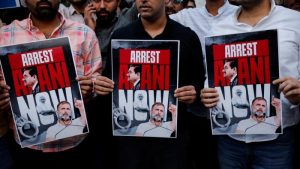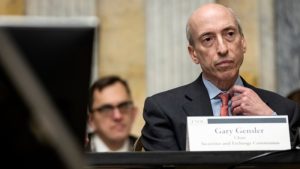The former PwC partner trying to reinvent the West Midlands
Richard Parker has spent his first months as Labour mayor of the West Midlands setting himself apart from his prominent and energetic Conservative predecessor Andy Street.
The contrast is clearest on transport: Street focused on delivery of a multimillion-pound tram line, 15 miles of which are operational so far; Parker wants to get back to basics with the buses.
“It’s not only about having priorities that are different, it is also about doing things differently,” said Parker, a soft-spoken former PwC partner, in an interview with the Financial Times.
Parker, who won the mayoralty in May by just 1,500 out of more than 2mn votes, is a marked contrast to his predecessor — more likely to be found operating behind the scenes than dashing to a photo op.
He has his work cut out for him, with all the local authorities in the region suffering to differing degrees from chronic underfunding.
The largest of all the bodies that come under Parker’s purview, the UK’s second-biggest city Birmingham, is undergoing the steepest cuts in local government history in an effort to recover from bankruptcy.
Along with Labour’s Andy Burnham in Greater Manchester, Parker will become the first mayor to benefit next year from a “trailblazing devolution deal” confirmed at the Budget on Wednesday. This will extend the West Midlands authority’s control over transport, regeneration and skills and give it more autonomy over how funds are spent.

The deal is a test of Labour’s commitment to decentralisation and will show whether shifting powers out of London can really improve the UK’s regions at a time of scarce local government resources.
“This deal is just the beginning, not the end,” said Parker, who wants to be still less beholden to targets set by Westminster and to have far greater say over where money is spent.
At present the West Midlands mayor only has responsibility for about 10 per cent of the regional skills budget: “I need to be able to shape these things myself to make a real difference.”
In other areas, like transport, Parker is shifting the focus from big ticket projects, to ones where he thinks he can maximise benefits to the public.
That means the Eastside extension of Birmingham’s tramline promoted by Street is not a priority for him. Instead he wants to emphasise a bus network that he said “has been neglected for far too long”.
Parker plans to follow Manchester with a franchising arrangement where the local authority regains ownership of the bus network and contracts out to transport operators to deliver the services it determines.
On housing, Parker is also changing the authority’s focus to what he calls the “biggest social housing programme in generations.” This would deliver 2,000 homes over his elected four-year term, he said.
To achieve his aims, the new mayor has shaken up governance of the area, scrapping “time-wasting” advisory boards, and bringing leaders of the seven West Midlands councils more closely into decision-making.
“I want to stand shoulder to shoulder with them and make sure I’m there, whether it’s for Birmingham or Dudley or anywhere else, to work with them as best as I can to make sure collectively we deliver for this region,” he said.
Parker has taken the reins of the mayoralty after a period of what he called an “osmosis” strategy where Birmingham has been regenerated but the surrounding areas have been neglected.
Despite the bankruptcy of Birmingham council, the city itself has enjoyed record levels of inward investment. Street, who was in office for eight years, won credit for this, as well as for his role in the regeneration of central Birmingham and renaissance of the post-industrial district of Digbeth as a dynamic hub for technology and creative business.
But the wider West Midlands, which includes the towns and cities of Coventry, Dudley, Sandwell, Solihull, Walsall, and Wolverhampton, hasn’t pulled together.
Large parts of the population — in Birmingham’s case one of the youngest and most culturally diverse in Europe — had been left behind, Parker said.
“We have got to build on the good stuff here. But we’ve also got to have a far more focused approach for those parts of the region that have been neglected for too long,” he said.
The son of a docker and a school secretary in Bristol, Parker left school at 16. But he was encouraged later to do his A-levels and went on to get an economics degree before becoming an accountant.
“I didn’t really want to be an accountant, but I thought if I got a professional qualification, it would give me choices. Where I came from, people didn’t have choices,” he said.
His career took him to Birmingham in the 1980s, first for British Telecom and then in 1989 to PwC, where between 2010 and 2015, Parker managed relations with Labour’s front bench when it was in opposition.

Parker’s journey has informed his decision to put skills and training at the centre of his mission. “We have twice the national average of people out of work,” he said.
In his first months, Parker has launched an employment scheme to create 20,000 training and apprenticeship placements for young people.
Gaining greater say over further education, he argues, will be pivotal in turning the region round and bridging a growing productivity gap with Manchester to the north.
Parker’s efforts have paid dividends already, he said, allowing him to get stalled plans for three new investment zones in the region over the line, including one where electric batteries will be made in Coventry.
However, his task, he acknowledged, is complicated by the crisis in local government financing, as adult and child social care and homelessness drain funds for everything else.
He is looking for ways to support the bankrupt Labour-run Birmingham city council, as it battles to rebalance its budget, for example by acquiring some of its land assets.
Parker said his predecessor had undermined confidence in the city by “making politics of Birmingham’s plight”. He added: “I haven’t got funds to bail them out, but we are looking at ways I can help.” Street declined to comment.
Parker said he was pragmatic about Prime Minister Sir Keir Starmer’s fiscal inheritance. “It’s not necessarily about having more money. It’s about having more freedom to use it,” he said.
A caption was corrected after first publication to indicate that Richard Parker defeated Andy Street
#PwC #partner #reinvent #West #Midlands




